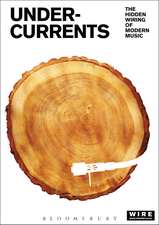Beyond No Future: Cultures of German Punk
Editat de Mirko M. Hall, Seth Howes, Dr. Cyrus M. Shahanen Limba Engleză Paperback – 21 mar 2018
| Toate formatele și edițiile | Preț | Express |
|---|---|---|
| Paperback (1) | 235.71 lei 6-8 săpt. | |
| Bloomsbury Publishing – 21 mar 2018 | 235.71 lei 6-8 săpt. | |
| Hardback (1) | 771.75 lei 6-8 săpt. | |
| Bloomsbury Publishing – 7 sep 2016 | 771.75 lei 6-8 săpt. |
Preț: 235.71 lei
Preț vechi: 304.70 lei
-23% Nou
Puncte Express: 354
Preț estimativ în valută:
45.10€ • 47.09$ • 37.33£
45.10€ • 47.09$ • 37.33£
Carte tipărită la comandă
Livrare economică 04-18 aprilie
Preluare comenzi: 021 569.72.76
Specificații
ISBN-13: 9781501314124
ISBN-10: 1501314122
Pagini: 224
Ilustrații: 10 bw illus
Dimensiuni: 152 x 229 x 15 mm
Greutate: 0.26 kg
Ediția:NIPPOD
Editura: Bloomsbury Publishing
Colecția Bloomsbury Academic
Locul publicării:New York, United States
ISBN-10: 1501314122
Pagini: 224
Ilustrații: 10 bw illus
Dimensiuni: 152 x 229 x 15 mm
Greutate: 0.26 kg
Ediția:NIPPOD
Editura: Bloomsbury Publishing
Colecția Bloomsbury Academic
Locul publicării:New York, United States
Caracteristici
Moves beyond the Anglo journalism of Rolling Stone or New Musical Express and the boundaries of both German Studies and punk studies
Notă biografică
Cyrus M. Shahan is Assistant Professor of German at Colby College, USA.Seth Howes is Assistant Professor of German Studies at the University of Missouri, USA.Mirko M. Hall is Associate Professor of German Studies and Chair of the Department of Languages, Cultures, and Literatures at Converse College, USA.
Cuprins
List of FiguresNotes on ContributorsAcknowledgements 1. Punk Matters: An Introduction(Seth Howes, University of Missouri; Mirko M. Hall, Converse College; Cyrus Shahan, Colby College) Punk Spaces 2. "I'd rather choose the curb": Topographical Writing in Recent German Punk(Dennis Borghardt, University of Duisburg-Essen)3. Beyond Boredom: Engaged Living in the Wilhelmine Wandervögel and West German Punk(Matthew Sikarskie, Michigan State University) Performative Politics 4. The Politics of Lyrics in German Punk(Peter Brandes, Ruhr-University Bochum)5. Subcultural Studies between the Blocs: Unexpected Cosmopolitanism and Stubborn Blind Spots in East German Theories of Punk(Seth Howes, University of Missouri) Against Fascism 6. Nazi Signifiers and the Narrative of Class Warfare in British Punk(Karen Fournier, University of Michigan)7. "1979 Deutschland": Holocaust, West German Memory Culture, and Punk's Intervention into the Everyday (Fabian Eckert, Humboldt University Berlin, and Melanie Eis, University of Cologne)8. Sex in the Bunker: DAF's Staging of Punk Pleasure(Cyrus Shahan, Colby College)9. Cold Wave: French Post-Punk Fantasies of Berlin(Mirko M. Hall, Converse College) 10. German Mania: A Coda (Seth Howes, University of Missouri; Mirko M. Hall, Converse College; Cyrus Shahan, Colby College) BibliographyIndex
Recenzii
Mirko Hall, Seth Howes, and Cyrus Shahan, who themselves boast an impressive body of work on punk and related aesthetics, have assembled a thoughtful collection of scholars representing well the interdisciplinary nature of punk studies, sound studies, and German studies.
Beyond No Future does much to affirm the importance of the punk to 20th century German history and its rightful place within a longer narrative of avant-garde aesthetics and autonomous cultural production in modern Germany. The four chapters on punk and fascism in Part Three would all provide excellent stand-alone readings for introducing German punk into undergraduate courses on modern Germany and post-war German culture.
This book does a wonderful job of both contextualizing punk's place within German history and showing how punk musicians worldwide have engaged with German history and politics.
At a time when scholarly and popular interest in the German punk and post-punk genres is steadily increasing, Beyond No Future is a very welcome collection. The contributors admirably redress the skew in much anglophone punk historiography. They demonstrate how punk was not merely a one-way street leading from the Anglo-American world, but how German cultural history--and not just the detourned swastikas--breathed into a larger transnational phenomenon. In particular, the book shows how punk resonated and became imbued with specifically German concerns, Western and Eastern, relating to memory, boredom, pleasure and more besides. Importantly, the authors do not seal off Deutschpunk into a particular era, but reveal its affective power in more recent times, and well beyond German borders too. Beyond No Future is a landmark collection that will be of interest to cultural historians and popular music scholars, as well as to music enthusiasts, more generally.
Ranging from the production of new cultural spaces to the notion of cultural memory as living process, this unique Anglophone collection in German punk studies fills a long-standing void. Offering multiple insights into punk's aesthetic and political responses to a divided and transnationally embedded Cold War Germany, the essays ultimately reach out beyond this music scene's historical moment of formation.
Although difficult to achieve, the book balances the complex mélange of the cultural, political and historical.
Beyond No Future does much to affirm the importance of the punk to 20th century German history and its rightful place within a longer narrative of avant-garde aesthetics and autonomous cultural production in modern Germany. The four chapters on punk and fascism in Part Three would all provide excellent stand-alone readings for introducing German punk into undergraduate courses on modern Germany and post-war German culture.
This book does a wonderful job of both contextualizing punk's place within German history and showing how punk musicians worldwide have engaged with German history and politics.
At a time when scholarly and popular interest in the German punk and post-punk genres is steadily increasing, Beyond No Future is a very welcome collection. The contributors admirably redress the skew in much anglophone punk historiography. They demonstrate how punk was not merely a one-way street leading from the Anglo-American world, but how German cultural history--and not just the detourned swastikas--breathed into a larger transnational phenomenon. In particular, the book shows how punk resonated and became imbued with specifically German concerns, Western and Eastern, relating to memory, boredom, pleasure and more besides. Importantly, the authors do not seal off Deutschpunk into a particular era, but reveal its affective power in more recent times, and well beyond German borders too. Beyond No Future is a landmark collection that will be of interest to cultural historians and popular music scholars, as well as to music enthusiasts, more generally.
Ranging from the production of new cultural spaces to the notion of cultural memory as living process, this unique Anglophone collection in German punk studies fills a long-standing void. Offering multiple insights into punk's aesthetic and political responses to a divided and transnationally embedded Cold War Germany, the essays ultimately reach out beyond this music scene's historical moment of formation.
Although difficult to achieve, the book balances the complex mélange of the cultural, political and historical.














